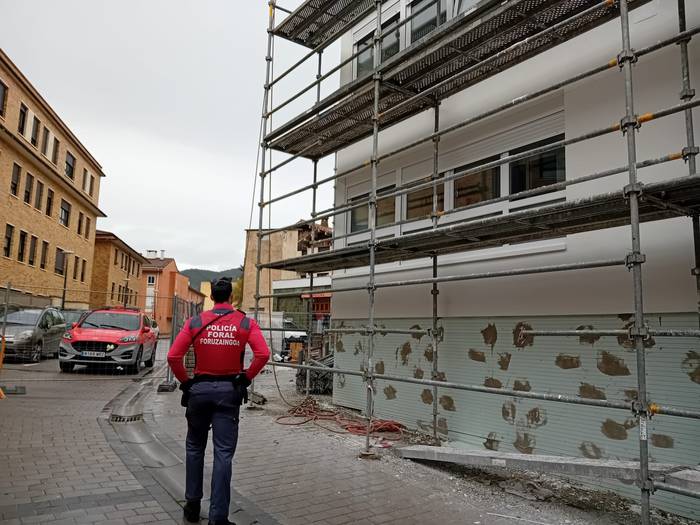What is behind the fall in unemployment in Hego Euskal Herria?
- In May there were 3,566 unemployed people less than in April in Hego Euskal Herria, and since last year unemployment has fallen by 7.5%. In Navarre it is where it has fallen the most, but in the other territories it has also been notable. The unions, in general, have taken this data with caution, saying that behind it is the impoverishment of workers and the worsening of working conditions.

The labour market has left the best data of recent times: In May, there were 3,566 less unemployed. 1,364 less in Navarre, 1,287 less in Bizkaia, 629 in Gipuzkoa and 286 less in Álava. In the percentage points it is also Navarre where it has fallen the most, with a decrease of 4% compared to April and 2% in the CAPV.
Throughout the year, the data are significant: since last May in Hego Euskal Herria there are 7.5% fewer unemployed, 15,764 fewer unemployed. There are currently 145,414 unemployed. In addition, the number of contributors has increased and according to data from the Government of Spain, in Hego Euskal Herria there were 7,163 people affiliated with the Social Security in the last month.
The Basque Government’s Employment and Employment Advisor, Idoia Mendia, has stated that they are “good news”. Mendia also recalled the context of the pandemic and the war in Ukraine: "Companies and workers are overcoming all the difficulties." The President of Navarra, María Chivite, pointed out in a gesture to the last labor reform that "it is clear that the measures being taken by the governments of Spain and Navarre are bearing fruit".
What's behind it? Precariousness, instability and low wages
Trade unions are less satisfied. Whilst acknowledging that the data is optimistic, Mitxel Lakuntza has pointed out that there is still a "long way" to reach the situation in other countries of the European Union.
"We can say that the proliferation of permanent discontinuous contracts is giving rise to legal coverage of new forms of instability,"
LAB syndicate
The secretary general of the ELA trade union says that behind it is the impoverishment of the worker, and EiTB has taken up his words: "In Hego Euskal Herria there are thousands of people in a precarious situation, many with low wages, job insecurity and many with occasional contracts that want to hide after the labor reform the name of permanent discontinuous workers".
ELA provides other data that contrasts with the public administration's "good news" about unemployment: three out of four contracts signed in May remain provisional. In addition, he says that permanent discontinuous contracts have been very upward and that with this they are "making reality worse": "Discontinuous permanent workers' improvements are null and void in relation to temporary contracts."
LAB has also focused on these permanent discontinued contracts, highlighting that they already account for 36.2% of indefinite contracts and that only one in four is full-time: "We can say that the proliferation of permanent discontinued contracts is giving rise to legal coverage of new forms of instability."
LAB says that unemployment has fallen precisely in those sectors and groups where precarious working conditions predominate, especially among young people and women.
For her part, the Secretary of Employment and Training of the Basque Country, Arantxa Niño UGT, wanted to explain what lies behind Lanbide's "good news": half of the contracts signed between women are part-time, "almost always unwilling and reflecting greater job insecurity among women".
Zenbait urtetatik hona sarri entzuten dugun kontzeptua da zaurgarritasuna. Gaur gaurkoz, diskurtso politikoetan pertsona zaurgarriez aritzea ohikoa da. Seguru nago nik ere inoiz erabili dudala berba hori Bizilan.eus webgunean, eskubide laboralak eta prestazio sozialak azaltzeko... [+]
Economists love the charts that represent the behaviors of the markets, which are curves. I was struck by the analogy of author Cory Doctorow in the article “The future of Amazon coders is the present of Amazon warehouse workers” on the Pluralistic website. He researches the... [+]
Buñueleko (Nafarroa) kasuan, 34 urteko gizona makina batean harrapatuta geratu da. Arratzun (Bizkaia), aldiz, garabiak goi-tentsioko linea bat ukitu ostean hil da 61 urteko gizona.
Betsaide enpresan gertatu da, 08:00ak aldera. Urtea hasi denetik gutxienez bederatzi behargin hil dira.
2024ko laneko ezbeharren txostena aurkeztu dute LAB • ESK • STEILAS • EHNE-etxalde eta HIRU sindikatuek aurtengo otsailean. Emaitza larriak bildu dituzte: geroz eta behargin gehiago hiltzen dira haien lanpostuetan.
Jakina da lan ikuskariak falta ditugula geurean. Hala ere, azken egunotan datu argigarriak ematea lortu dute: lan ikuskaritzaren arabera, EAEko enpresen %64ak ez du ordutegien kontrolean legedia betetzen. Era berean, lehendakariordeak gaitzetsi du, absentismoaren eta oinarrizko... [+]






















